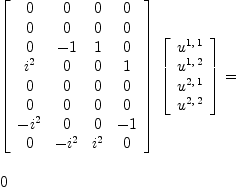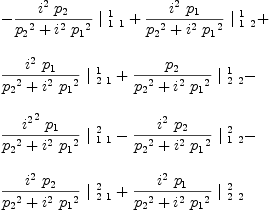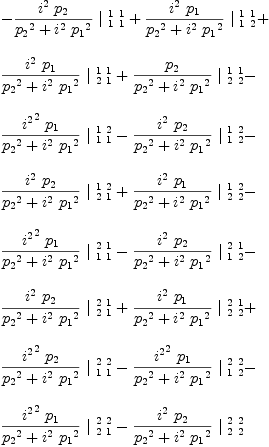The Algebra of Complex Numbers Is Frobenius In Many Ways
Linear operators over a 2-dimensional vector space representing the algebra of complex numbers
Ref:
We need the Axiom LinearOperator? library.
axiom
)library CARTEN ARITY CMONAL CPROP CLOP CALEY
CartesianTensor is now explicitly exposed in frame initial
CartesianTensor will be automatically loaded when needed from
/var/zope2/var/LatexWiki/CARTEN.NRLIB/CARTEN
Arity is now explicitly exposed in frame initial
Arity will be automatically loaded when needed from
/var/zope2/var/LatexWiki/ARITY.NRLIB/ARITY
ClosedMonoidal is now explicitly exposed in frame initial
ClosedMonoidal will be automatically loaded when needed from
/var/zope2/var/LatexWiki/CMONAL.NRLIB/CMONAL
ClosedProp is now explicitly exposed in frame initial
ClosedProp will be automatically loaded when needed from
/var/zope2/var/LatexWiki/CPROP.NRLIB/CPROP
ClosedLinearOperator is now explicitly exposed in frame initial
ClosedLinearOperator will be automatically loaded when needed from
/var/zope2/var/LatexWiki/CLOP.NRLIB/CLOP
CaleyDickson is now explicitly exposed in frame initial
CaleyDickson will be automatically loaded when needed from
/var/zope2/var/LatexWiki/CALEY.NRLIB/CALEY
Use the following macros for convenient notation
axiom
-- summation
macro Σ(x,i,n)==reduce(+,[x for i in n])
Type: Void
axiom
-- list
macro Ξ(f,i,n)==[f for i in n]
Type: Void
axiom
-- subscript and superscripts
macro sb == subscript
Type: Void
axiom
macro sp == superscript
Type: Void
𝐋 is the domain of 2-dimensional linear operators over the rational functions ℚ (Expression Integer), i.e. ratio of polynomials with integer coefficients.
axiom
dim:=2
axiom
macro ℒ == List
Type: Void
axiom
macro ℂ == CaleyDickson
Type: Void
axiom
macro ℚ == Expression Integer
Type: Void
axiom
𝐋 := ClosedLinearOperator(OVAR ['1,'2], ℚ)
Type: Type
axiom
𝐞:ℒ 𝐋 := basisOut()
Type: List(ClosedLinearOperator
?(OrderedVariableList
?([1,
2]),
Expression(Integer)))
axiom
𝐝:ℒ 𝐋 := basisIn()
Type: List(ClosedLinearOperator
?(OrderedVariableList
?([1,
2]),
Expression(Integer)))
axiom
I:𝐋:=[1] -- identity for composition
Type: ClosedLinearOperator
?(OrderedVariableList
?([1,
2]),
Expression(Integer))
axiom
X:𝐋:=[2,1] -- twist
Type: ClosedLinearOperator
?(OrderedVariableList
?([1,
2]),
Expression(Integer))
axiom
V:𝐋:=ev(1) -- evaluation
Type: ClosedLinearOperator
?(OrderedVariableList
?([1,
2]),
Expression(Integer))
axiom
Λ:𝐋:=co(1) -- co-evaluation
Type: ClosedLinearOperator
?(OrderedVariableList
?([1,
2]),
Expression(Integer))
axiom
equate(eq)==map((x,y)+->(x=y),ravel lhs eq, ravel rhs eq);
Type: Void
Now generate structure constants for Complex Algebra
The basis consists of the real and imaginary units. We use complex multiplication to form the "multiplication table" as a matrix. Then the structure constants can be obtained by dividing each matrix entry by the list of basis vectors.
Split-complex can be specified by Caley-Dickson parameter (q0 = -1)
axiom
--q:=1 -- split-complex
q:=sp('i,[2])
Type: Symbol
axiom
QQ := ℂ(ℚ,'i,q);
Type: Type
Basis: Each B.i is a quaternion number
axiom
B:ℒ QQ := map(x +-> hyper x,1$SQMATRIX(dim,ℚ)::ℒ ℒ ℚ)
Type: List(CaleyDickson
?(Expression(Integer),
i,
*001i(2)))
axiom
-- Multiplication table:
M:Matrix QQ := matrix Ξ(Ξ(B.i*B.j, i,1..dim), j,1..dim)
Type: Matrix(CaleyDickson
?(Expression(Integer),
i,
*001i(2)))
axiom
-- Function to divide the matrix entries by a basis element
S(y) == map(x +-> real real(x/y),M)
Type: Void
axiom
-- The result is a nested list
ѕ :=map(S,B)::ℒ ℒ ℒ ℚ
axiom
Compiling function S with type CaleyDickson(Expression(Integer),i,
*001i(2)) -> Matrix(Expression(Integer))
Type: List(List(List(Expression(Integer))))
axiom
-- structure constants form a tensor operator
Y := Σ(Σ(Σ(ѕ(i)(k)(j)*𝐞.i*𝐝.j*𝐝.k, i,1..dim), j,1..dim), k,1..dim)
Type: ClosedLinearOperator
?(OrderedVariableList
?([1,
2]),
Expression(Integer))
axiom
arity Y
Type: ClosedProp
?(ClosedLinearOperator
?(OrderedVariableList
?([1,
2]),
Expression(Integer)))
axiom
matrix Ξ(Ξ((𝐞.i*𝐞.j)/Y, i,1..dim), j,1..dim)
Type: Matrix(ClosedLinearOperator
?(OrderedVariableList
?([1,
2]),
Expression(Integer)))
Multiplication of arbitrary quaternions  and
and 
axiom
a:=Σ(sb('a,[i])*𝐞.i, i,1..dim)
Type: ClosedLinearOperator
?(OrderedVariableList
?([1,
2]),
Expression(Integer))
axiom
b:=Σ(sb('b,[i])*𝐞.i, i,1..dim)
Type: ClosedLinearOperator
?(OrderedVariableList
?([1,
2]),
Expression(Integer))
axiom
(a*b)/Y
Type: ClosedLinearOperator
?(OrderedVariableList
?([1,
2]),
Expression(Integer))
Multiplication is Associative
axiom
test(
( I Y ) / _
( Y ) = _
( Y I ) / _
( Y ) )
Type: Boolean
A scalar product is denoted by the (2,0)-tensor

axiom
U:=Σ(Σ(script('u,[[],[i,j]])*𝐝.i*𝐝.j, i,1..dim), j,1..dim)
Type: ClosedLinearOperator
?(OrderedVariableList
?([1,
2]),
Expression(Integer))
Definition 1
We say that the scalar product is associative if the tensor
equation holds:
Y = Y
U U
In other words, if the (3,0)-tensor:
(three-point function) is zero.
Using the LinearOperator? domain in Axiom and some carefully chosen symbols we can easily enter expressions that are both readable and interpreted by Axiom as "graphical calculus" diagrams describing complex products and compositions of linear operators.
axiom
ω:𝐋 :=
( Y I ) /
U -
( I Y ) /
U
Type: ClosedLinearOperator
?(OrderedVariableList
?([1,
2]),
Expression(Integer))
Definition 2
An algebra with a non-degenerate associative scalar product
is called a [Frobenius Algebra]?.
The Cartan-Killing Trace
axiom
Ú:=
( Y Λ ) / _
( Y I ) / _
V
Type: ClosedLinearOperator
?(OrderedVariableList
?([1,
2]),
Expression(Integer))
axiom
Ù:=
( Λ Y ) / _
( I Y ) / _
V
Type: ClosedLinearOperator
?(OrderedVariableList
?([1,
2]),
Expression(Integer))
axiom
test(Ù=Ú)
Type: Boolean
forms a non-degenerate associative scalar product for Y
axiom
Ũ := Ù
Type: ClosedLinearOperator
?(OrderedVariableList
?([1,
2]),
Expression(Integer))
axiom
test
( Y I ) /
Ũ =
( I Y ) /
Ũ
Type: Boolean
axiom
determinant Ξ(Ξ(retract((𝐞.i * 𝐞.j)/Ũ), j,1..dim), i,1..dim)
Type: Expression(Integer)
General Solution
We may consider the problem where multiplication Y is given,
and look for all associative scalar products 
This problem can be solved using linear algebra.
axiom
)expose MCALCFN
MultiVariableCalculusFunctions is now explicitly exposed in frame
initial
J := jacobian(ravel ω,concat map(variables,ravel U)::ℒ Symbol);
Type: Matrix(Expression(Integer))
axiom
u := transpose matrix [concat map(variables,ravel U)::ℒ Symbol];
Type: Matrix(Polynomial(Integer))
axiom
J::OutputForm * u::OutputForm = 0
Type: Equation(OutputForm
?)
axiom
nrows(J),ncols(J)
Type: Tuple(PositiveInteger
?)
The matrix J transforms the coefficients of the tensor  into coefficients of the tensor
into coefficients of the tensor  . We are looking for
the general linear family of tensors
. We are looking for
the general linear family of tensors  such that
such that
J transforms  into
into  for any such
for any such  .
.
If the null space of the J matrix is not empty we can use
the basis to find all non-trivial solutions for U:
axiom
Ñ:=nullSpace(J)
Type: List(Vector(Expression(Integer)))
axiom
ℰ:=map((x,y)+->x=y, concat
map(variables,ravel U), entries Σ(sb('p,[i])*Ñ.i, i,1..#Ñ) )
Type: List(Equation(Expression(Integer)))
This defines a family of pre-Frobenius algebras:
axiom
zero? eval(ω,ℰ)
Type: Boolean
In general the pairing is symmetric!
axiom
Ų:𝐋 := eval(U,ℰ)
Type: ClosedLinearOperator
?(OrderedVariableList
?([1,
2]),
Expression(Integer))
axiom
matrix Ξ(Ξ((𝐞.i 𝐞.j)/Ų, i,1..dim), j,1..dim)
Type: Matrix(ClosedLinearOperator
?(OrderedVariableList
?([1,
2]),
Expression(Integer)))
This is the most general form of the "dot product" of two quaternions
axiom
(a*b)/Ų
Type: ClosedLinearOperator
?(OrderedVariableList
?([1,
2]),
Expression(Integer))
axiom
(a*a)/Ų
Type: ClosedLinearOperator
?(OrderedVariableList
?([1,
2]),
Expression(Integer))
Cartan-Killing is a special case
axiom
ck:=solve(equate(Ũ=Ų),Ξ(sb('p,[i]), i,1..#Ñ)).1
axiom
Compiling function equate with type Equation(ClosedLinearOperator(
OrderedVariableList([1,2]),Expression(Integer))) -> List(Equation
(Expression(Integer)))Type: List(Equation(Expression(Integer)))
The scalar product must be non-degenerate:
axiom
Ů:=determinant Ξ(Ξ(retract((𝐞.i * 𝐞.j)/Ų), j,1..dim), i,1..dim)
Type: Expression(Integer)
axiom
factor(numer Ů)/factor(denom Ů)
Type: Fraction(Factored(SparseMultivariatePolynomial
?(Integer,
Kernel(Expression(Integer)))))
Definition 3
Co-pairing
Solve the [Snake Relation]? as a system of linear equations.
axiom
Ω:𝐋:=Σ(Σ(script('u,[[i,j]])*𝐞.i*𝐞.j, i,1..dim), j,1..dim)
Type: ClosedLinearOperator
?(OrderedVariableList
?([1,
2]),
Expression(Integer))
axiom
d1:=(I*Ω)/(Ų*I);
Type: ClosedLinearOperator
?(OrderedVariableList
?([1,
2]),
Expression(Integer))
axiom
d2:=(Ω*I)/(I*Ų);
Type: ClosedLinearOperator
?(OrderedVariableList
?([1,
2]),
Expression(Integer))
axiom
eq1:=equate(d1=I);
Type: List(Equation(Expression(Integer)))
axiom
eq2:=equate(d2=I);
Type: List(Equation(Expression(Integer)))
axiom
snake:=solve(concat(eq1,eq2),concat Ξ(Ξ(script('u,[[i,j]]), i,1..dim), j,1..dim));
Type: List(List(Equation(Expression(Integer))))
axiom
if #snake ~= 1 then error "no solution"
Type: Void
axiom
Ω:=eval(Ω,snake(1))
Type: ClosedLinearOperator
?(OrderedVariableList
?([1,
2]),
Expression(Integer))
axiom
matrix Ξ(Ξ(Ω/(𝐝.i*𝐝.j), i,1..dim), j,1..dim)
Type: Matrix(ClosedLinearOperator
?(OrderedVariableList
?([1,
2]),
Expression(Integer)))
Check "dimension" and the snake relations.
axiom
d:𝐋:=
Ω /
X /
Ų
Type: ClosedLinearOperator
?(OrderedVariableList
?([1,
2]),
Expression(Integer))
axiom
test
( I Ω ) /
( Ų I ) = I
Type: Boolean
axiom
test
( Ω I ) /
( I Ų ) = I
Type: Boolean
Definition 4
Co-algebra
Compute the "three-point" function and use it to define co-multiplication.
axiom
W:=(Y,I)/Ų
Type: ClosedLinearOperator
?(OrderedVariableList
?([1,
2]),
Expression(Integer))
axiom
λ:=(Ω,I,Ω)/(I,W,I)
Type: ClosedLinearOperator
?(OrderedVariableList
?([1,
2]),
Expression(Integer))
axiom
test
( I Ω ) /
( Y I ) = λ
Type: Boolean
axiom
test
( Ω I ) /
( I Y ) = λ
Type: Boolean
Co-associativity
axiom
test(
( λ ) / _
( I λ ) = _
( λ ) / _
( λ I ) )
Type: Boolean
Frobenius Condition (fork)
axiom
H :=
Y /
λ
Type: ClosedLinearOperator
?(OrderedVariableList
?([1,
2]),
Expression(Integer))
axiom
test
( λ I ) /
( I Y ) = H
Type: Boolean
axiom
test
( I λ ) /
( Y I ) = H
Type: Boolean
The Cartan-Killing form makes H of the Frobenius condition idempotent
axiom
test( eval(H,ck)=eval(H/H,ck) )
Type: Boolean
And it is unique.
axiom
h1:=map(numer,ravel(H-H/H)::List FRAC POLY INT);
Type: List(Polynomial(Integer))
axiom
h2:=groebner h1
Type: List(Polynomial(Integer))
axiom
ck4:=solve(h2,[p[1],p[2]])
Type: List(List(Equation(Fraction(Polynomial(Integer)))))
axiom
test( eval(H,ck4.2)=eval(H/H,ck4.2) )
Type: Boolean
axiom
determinant Ξ(Ξ(retract( (𝐞.i * 𝐞.j)/eval(Ų,ck4.2) ), j,1..dim), i,1..dim)
Type: Expression(Integer)
Handle
axiom
Φ:𝐋 :=
λ /
Y
Type: ClosedLinearOperator
?(OrderedVariableList
?([1,
2]),
Expression(Integer))
The Cartan-Killing form makes Φ of the identity
axiom
test( eval(Φ,ck)=I )
Type: Boolean
and it can be the identity in only this one way.
axiom
solve(equate(Φ=I),[p[1],p[2]])
Type: List(List(Equation(Expression(Integer))))
If handle is identity then fork is idempotent but the converse is not true
axiom
Φ1:=map(numer,ravel(Φ-I)::List FRAC POLY INT);
Type: List(Polynomial(Integer))
axiom
Φ2:=groebner Φ1
Type: List(Polynomial(Integer))
axiom
in?(ideal h2, ideal Φ2)
Type: Boolean
axiom
in?(ideal Φ2, ideal h2)
Type: Boolean
Bi-algebra conditions
axiom
ΦΦ:= _
( λ λ ) / _
( I X I ) / _
( Y Y );
Type: ClosedLinearOperator
?(OrderedVariableList
?([1,
2]),
Expression(Integer))
axiom
test( H/H = ΦΦ )
Type: Boolean
The Cartan Killing form is a bi-algebra
axiom
bi1:=map(numer,ravel(ΦΦ-H)::List FRAC POLY INT);
Type: List(Polynomial(Integer))
axiom
bi2:=groebner bi1
Type: List(Polynomial(Integer))
axiom
b:=solve( equate(ΦΦ=H), [sb('p,[i]) for i in 1..#Ñ] )
Type: List(List(Equation(Expression(Integer))))
axiom
test(eval(Ų, b.1)=Ũ)
Type: Boolean
Scalars for figure 12 (only 1 non-zero for Cartan-Killing form)
axiom
φφ:= _
( Ω Ω ) / _
( I X I ) / _
( Y Y );
Type: ClosedLinearOperator
?(OrderedVariableList
?([1,
2]),
Expression(Integer))
axiom
φφ1:=map((x:ℚ):ℚ+->numer x,φφ)
Type: ClosedLinearOperator
?(OrderedVariableList
?([1,
2]),
Expression(Integer))
axiom
φφ2:=denom(ravel(φφ).1)
Type: SparseMultivariatePolynomial
?(Integer,
Kernel(Expression(Integer)))
axiom
test(φφ=(1/φφ2)*φφ1)
Type: Boolean
axiom
eval(φφ,ck)
Type: ClosedLinearOperator
?(OrderedVariableList
?([1,
2]),
Expression(Integer))
Definition 5
i = Unit of the algebra
axiom
i:=𝐞.1
Type: ClosedLinearOperator
?(OrderedVariableList
?([1,
2]),
Expression(Integer))
axiom
test
i /
λ = Ω
Type: Boolean
Co-unit
i
U
axiom
ι:𝐋:=
( i I ) /
Ų
Type: ClosedLinearOperator
?(OrderedVariableList
?([1,
2]),
Expression(Integer))
Y=U
ι
axiom
test
Y /
ι = Ų
Type: Boolean
For example:
axiom
ex1:=[q=1,p[1]=0,p[2]=1]
Type: List(Equation(Polynomial(Integer)))
axiom
Ų0:𝐋 :=eval(Ų,ex1)
Type: ClosedLinearOperator
?(OrderedVariableList
?([1,
2]),
Expression(Integer))
axiom
Ω0:𝐋 :=eval(Ω,ex1)$𝐋
Type: ClosedLinearOperator
?(OrderedVariableList
?([1,
2]),
Expression(Integer))
axiom
λ0:𝐋 :=eval(λ,ex1)$𝐋
Type: ClosedLinearOperator
?(OrderedVariableList
?([1,
2]),
Expression(Integer))
axiom
Φ0:𝐋 :=eval(Φ,ex1)$𝐋
Type: ClosedLinearOperator
?(OrderedVariableList
?([1,
2]),
Expression(Integer))
 -permuted Frobenius Algebras
-permuted Frobenius Algebras![]() and
and ![]()
![]()
(2.2,0.1)(2.6,0.1)(2.6,0.9)
\psline[linewidth=0.04cm](2.4,0.3)(2.4,-0.1)
\psbezier[linewidth=0.04](2.4,-0.1)(2.4,-0.9)(3.0,-0.9)(3.0,-0.1)
\psline[linewidth=0.04cm](3.0,-0.1)(3.0,0.9)
\psbezier[linewidth=0.04](4.8,0.9)(4.8,0.1)(4.4,0.1)(4.4,0.9)
\psline[linewidth=0.04cm](4.6,0.3)(4.6,-0.1)
\psbezier[linewidth=0.04](4.6,-0.1)(4.6,-0.9)(4.0,-0.9)(4.0,-0.1)
\psline[linewidth=0.04cm](4.0,-0.1)(4.0,0.9)
\usefont{T1}{ptm}{m}{n}
\rput(3.4948437,0.205){-}
\psline[linewidth=0.04cm](0.6,-0.7)(0.6,0.9)
\psbezier[linewidth=0.04](0.0,-0.1)(0.0,-0.9)(1.2,-0.9)(1.2,-0.1)
\psline[linewidth=0.04cm](0.0,-0.1)(0.0,0.9)
\psline[linewidth=0.04cm](1.2,-0.1)(1.2,0.9)
\usefont{T1}{ptm}{m}{n}
\rput(1.6948438,0.205){=}
\end{pspicture}
}
\scalebox{1} % Change this value to rescale the drawing.
{
\begin{pspicture}(0,-0.92)(4.82,0.92)
\psbezier[linewidth=0.04](2.2,0.9)(2.2,0.1)(2.6,0.1)(2.6,0.9)
\psline[linewidth=0.04cm](2.4,0.3)(2.4,-0.1)
\psbezier[linewidth=0.04](2.4,-0.1)(2.4,-0.9)(3.0,-0.9)(3.0,-0.1)
\psline[linewidth=0.04cm](3.0,-0.1)(3.0,0.9)
\psbezier[linewidth=0.04](4.8,0.9)(4.8,0.1)(4.4,0.1)(4.4,0.9)
\psline[linewidth=0.04cm](4.6,0.3)(4.6,-0.1)
\psbezier[linewidth=0.04](4.6,-0.1)(4.6,-0.9)(4.0,-0.9)(4.0,-0.1)
\psline[linewidth=0.04cm](4.0,-0.1)(4.0,0.9)
\usefont{T1}{ptm}{m}{n}
\rput(3.4948437,0.205){-}
\psline[linewidth=0.04cm](0.6,-0.7)(0.6,0.9)
\psbezier[linewidth=0.04](0.0,-0.1)(0.0,-0.9)(1.2,-0.9)(1.2,-0.1)
\psline[linewidth=0.04cm](0.0,-0.1)(0.0,0.9)
\psline[linewidth=0.04cm](1.2,-0.1)(1.2,0.9)
\usefont{T1}{ptm}{m}{n}
\rput(1.6948438,0.205){=}
\end{pspicture}
}](images/2375189246716000159-16.0px.png)

![]()

![]() into coefficients of the tensor
into coefficients of the tensor ![]() . We are looking for
the general linear family of tensors
. We are looking for
the general linear family of tensors ![]() such that
such that
![]() into
into ![]() for any such
for any such ![]() .
.




![\label{eq56}\begin{array}{@{}l}
\displaystyle
\left[{{{p_{2}}^3}+{2 \ {i^{2}}\ {{p_{2}}^2}}+{{i^{2}}\ {{p_{1}}^2}\ {p_{2}}}-{2 \ {{i^{2}}^2}\ {{p_{1}}^2}}}, \: \right.
\
\
\displaystyle
\left.{{{i^{2}}\ {p_{1}}\ {{p_{2}}^2}}+{4 \ {{i^{2}}^2}\ {p_{1}}\ {p_{2}}}+{{{i^{2}}^2}\ {{p_{1}}^3}}}, \:{{{i^{2}}^3}\ {p_{1}}\ {p_{2}}}, \:{{{i^{2}}^4}\ {{p_{1}}^3}}\right]
\label{eq56}\begin{array}{@{}l}
\displaystyle
\left[{{{p_{2}}^3}+{2 \ {i^{2}}\ {{p_{2}}^2}}+{{i^{2}}\ {{p_{1}}^2}\ {p_{2}}}-{2 \ {{i^{2}}^2}\ {{p_{1}}^2}}}, \: \right.
\
\
\displaystyle
\left.{{{i^{2}}\ {p_{1}}\ {{p_{2}}^2}}+{4 \ {{i^{2}}^2}\ {p_{1}}\ {p_{2}}}+{{{i^{2}}^2}\ {{p_{1}}^3}}}, \:{{{i^{2}}^3}\ {p_{1}}\ {p_{2}}}, \:{{{i^{2}}^4}\ {{p_{1}}^3}}\right]](images/9209666825485437265-16.0px.png)

![\label{eq67}\begin{array}{@{}l}
\displaystyle
\left[{{{p_{2}}^3}+{2 \ {i^{2}}\ {{p_{2}}^2}}+{{i^{2}}\ {{p_{1}}^2}\ {p_{2}}}-{2 \ {{i^{2}}^2}\ {{p_{1}}^2}}}, \: \right.
\
\
\displaystyle
\left.{{{i^{2}}\ {p_{1}}\ {{p_{2}}^2}}+{4 \ {{i^{2}}^2}\ {p_{1}}\ {p_{2}}}+{{{i^{2}}^2}\ {{p_{1}}^3}}}, \:{{{i^{2}}^3}\ {p_{1}}\ {p_{2}}}, \:{{{i^{2}}^4}\ {{p_{1}}^3}}\right]
\label{eq67}\begin{array}{@{}l}
\displaystyle
\left[{{{p_{2}}^3}+{2 \ {i^{2}}\ {{p_{2}}^2}}+{{i^{2}}\ {{p_{1}}^2}\ {p_{2}}}-{2 \ {{i^{2}}^2}\ {{p_{1}}^2}}}, \: \right.
\
\
\displaystyle
\left.{{{i^{2}}\ {p_{1}}\ {{p_{2}}^2}}+{4 \ {{i^{2}}^2}\ {p_{1}}\ {p_{2}}}+{{{i^{2}}^2}\ {{p_{1}}^3}}}, \:{{{i^{2}}^3}\ {p_{1}}\ {p_{2}}}, \:{{{i^{2}}^4}\ {{p_{1}}^3}}\right]](images/8634764449687999207-16.0px.png)
